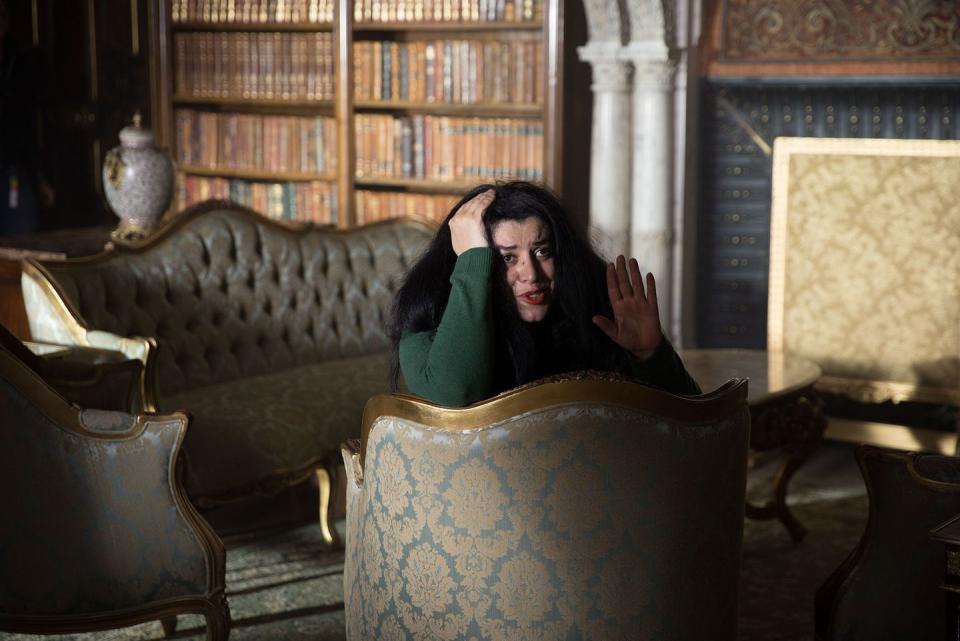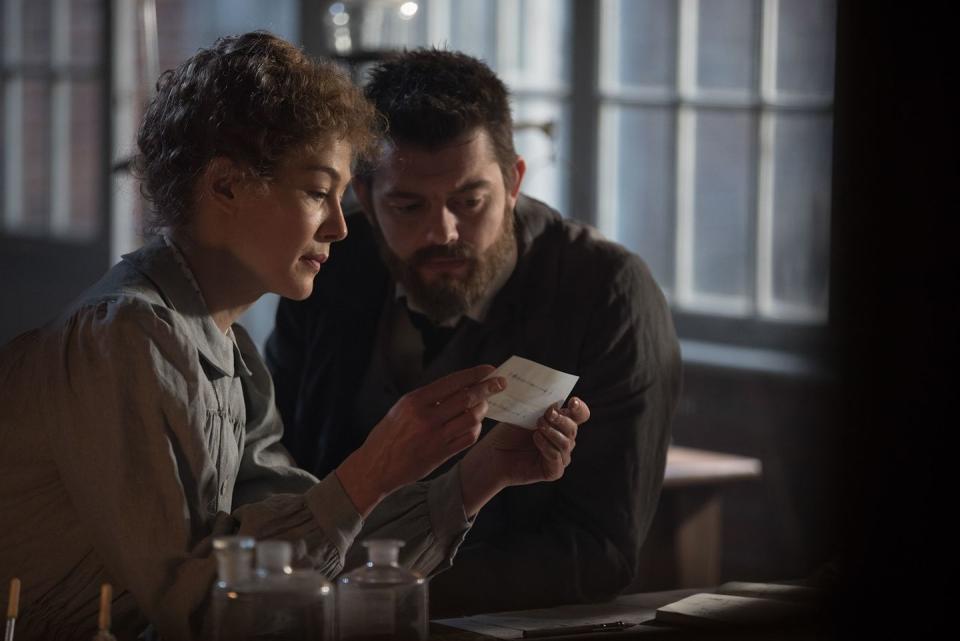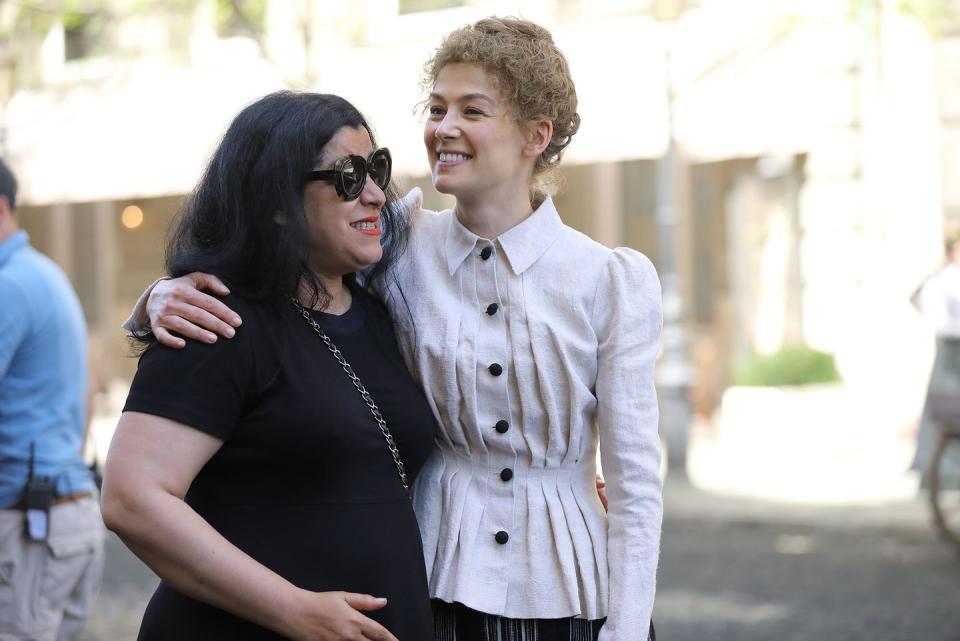Persepolis Author Marjane Satrapi on 'Radioactive,' Marie Curie, and the Accident That Is Her Career

It only takes a few minutes for Marjane Satrapi to pull out her cigarette, and the effect is complete: the woman I came to know years ago in Persepolis has manifested inside my phone screen. Her trademark bushy mane, swipe of red lipstick, and mole are all there, albeit in more detail than the black-and-white outlined version I first met in the pages of Satrapi's graphic memoir.
Marjane Satrapi is best known for her autobiographical graphic novel, which became something of an international sensation following its publication in the early 2000s. Originally released in French, and created in Paris, her adopted home, the book uses the story of Satrapi's life in Tehran to explore the origins and lasting effects of the Iranian Revolution. It's a compelling, highly personal memoir, which speaks as much to the awkwardness and angst of adolescence as to Iran's complex political evolution.
Persepolis the acclaimed graphic novel became the source material for Persepolis the acclaimed animated film—a 2007 project that gave Satrapi her first taste of filmmaking. In the intervening years, she's pivoted from cartoonist to director, at first keeping the stories close to home (2011's Chicken with Plums was also based on one of Satrapi's graphic novels), then branching out (The Voices, which hit screens in 2014, stars Ryan Reynolds as a surprisingly endearing serial killer).
Her latest movie, Radioactive, which debuted on Amazon Prime Video last week, is also a departure: a biopic about Marie Curie, which interweaves Curie's life story with poignant vignettes about eventual uses—both beneficial and catastrophic—of her groundbreaking discoveries. To prepare, Satrapi had to immerse herself the science behind radioactivity (she says, "sometimes you have films about when they talk about science and it's all bullshit; you feel that it's all bullshit," and she couldn't have that), and read up on Curie herself. In both radium and Marie, she found compelling protagonists.
Satrapi discusses all this over FaceTime with a curious mixture of enthusiasm and detachment, periodically adjusting her rhinestone-encrusted headband and taking regular drags from her cigarette. Her passion—for Marie Curie, for filmmaking, for a hatred of some but not all U.S. states—runs deep, but she just as easily steps back, as if to consider what she's just said, as if it had come out of someone else's mouth. It's a byproduct, I think, of her genuine disinterest in other people's opinions of her. Where most would consider their words carefully, ensuring each carried the desired meaning, Marjane Satrapi does not. And she's a much more fun because of it.
Below, Satrapi considers the collaborative nature of filmmaking, the rare feminist man that is Pierre Curie, and the decades-long accident that is her own career—all with a wink and a lipstick-coated smile.

You've talked about how your mom always held up Marie Curie as a role model. What was it about her that your mother was drawn to?
My mom had this obsession that I had to become a very independent woman. If you want to talk about independence, you have to give some role models. Hers were Marie Curie and Simone de Beauvoir.
That was her plan for my life. That puts a lot of pressure on you.
How did your feelings about Marie evolve as you learned more about her?
I love her. I loved her even more. Before, I was really impressed by her, but then I loved her much more, because I loved this woman who is unapologetic. I loved this woman who is uncompromising. I love this woman who really does not care, because she does not have the time to care about what people may think about her. She wants to do her job... I think that nobody is more lovable than the people that don't ask for love.
I found that with somebody who amused me also a lot and I fell in love with. With her and with her husband, because I love him as much as I do love her.
What is it about him that you love so much?
That he's so fucking modern, for Christ's sake. At the end of 19th century, the man wants a wife that is his partner and his equal. There are not many men today who would like that, who will fight for his wife to have same stuff as him.
Imagine end of 19th century, if she's modern, he's hyper-modern. He's even more modern than she is... But I think it's the couple. I mean, it's her and it's him, but she was the chemistry and he was the physicist. This whole thing is possible because you have this nuclear fusion between them. It's that, that as a matter of fact, all of that becomes possible.

You met with Marie's granddaughter. What was that like?
She's very impressive... What she told me is please don't forget Pierre. Because their history was like that: at the beginning, everything was about Pierre; then it became Pierre and Marie Curie; now it's Marie Curie and nobody gives a fuck about Pierre. She was like, "Please don't forget he was also important."
Do you know if she's seen the movie?
Yes, we showed her. I almost died the day that we showed it to her and to her brother. Because when I do something, it is so much that you want to please some people, or you don't want to please some people. But these two, they're her grandchildren. So I cannot say I don't care, because I do care.
The result was good. I was like, "Oh my god."
I was reading some other articles about the movie. People often compare you as a person to the character of Marie, since you're both strong woman. What do you think about those comparisons?
I don't know. If people see me as a very strong woman, good for me.
But at the end of the day, people they should not forget, the woman, she was a genius. I don't have any Nobel prizes and I don't think I'm a genius. But these are things, because every time you make something, you have to find some equal in stars. These are things, for example, a little more easy maybe for me to understand, because she, like me, we arrived in our early 30s to Paris because we could not do what we wanted to do in our own country.
There were things that I could connect with, and also probably the thing that I really don't care if people they do like me or not. I don't like everybody, so I don't know why should everybody like me. That's okay. Most of the people don't matter, so if most of the people they don't like me, that's fine.
So many people know your story, because of Persepolis and because that's what launched your career in filmmaking. What's it like that when you talk to people like me, like I know your whole story?
You think you know my whole story. Believe me, if 24 years of my life could be put into two comic books, it means that I would have a miserable life. Much more has happened. But yes, but what you know, these are the things that you know. Obviously that the thing that I say is the thing that is okay for me for people to know...
Actually, it's okay. I think it makes it easier, basically, for me. Because you know some stuff about me, so I don't have to explain everything to you. So yeah, it's a good thing.
It's like a shortcut.
Yeah.
Did you always want to tell stories in some form?
Yeah. That's started with me. When I was a child, I was a huge liar. At the time, they called me a liar; they couldn't see that I had a huge imagination. I wanted the thing to be in a certain way, so then I told the story that it went a certain way. Then they became in a certain way, because it was a self-fulfilling prophecy.

But you weren't always planning on being a filmmaker, right?
My dear, I never planned to do anything in my life. My life is just things that happened. I always knew that as I grew up, I always knew that I did not want to be, I don't know, an engineer or a doctor or a teacher. I knew I wanted to do something different.
For a long time, because I grew up in the 70s, I wanted to be a bank robber. I was like, "What a cool life." Until I understood that basically you can go to jail, and if you go to jail, that is really not cool. So then I changed my plan.
Then I made some artistic things and I wanted to be an illustrator. A path in a studio. In a studio, everybody is making comics. So I become a cartoonist. Then I meet this guy who wants to become a producer. He said, "Let's make a movie." I'm like, "No, I don't want to make a movie. Why should I make the movie?" Then I'm like, "Well, they're going to pay me, and I will learn something new." It would have been stupid to say no. I was like, "Okay. Let's make it. In the worse case, I make a really bad film and then I come back and I made my comics." I don't have this career plan, like I will do this and I will do that.
As long as I am amused and happy to make films, then I will make them. If it does not give me anything anymore, then I will stop doing it and we'll see what I will do next... In 15 years I have to make a radical change, but I have not figured out yet what.
What is it about movies that keeps you interested?
When I make a film, I think something; he [director of photography] thinks something; the producer says there's something; the actors, they think. Everybody thinks something. Then the editors takes all of that, re-write another story. So most of the time, you actually find yourself in the thing that it was not planned this way. You have this notion of surprise.
Another thing is that films are a machine of creating empathy and compassion. I don't know any other media that has this capacity. Really no other. I think the reason, for example, that American culture took all over the world is because of American cinema. Because people they saw all these film and they are like, yeah, we are going to live like this. It's a very, actually, it's a very non-expensive way to go and invade people. For the price of a war plane, you can make 100 movies. You can invade people culturally and even don't even need to kill them, you can just convince them.
What's it like to release a movie during a pandemic? I imagine it's not the premiere you imagined.
It's shit. It's shit. I will tell you, it's the worst thing that could happen to you. At the beginning, I was so sad, because it was in the cinemas at first, then after three days, gone. But then you're like, okay. The movie exists. If people they don't see it in the cinema, they will see it somewhere else. I finished my job. I will paint. Blah, blah, blah.
Then you think about all these people that will lose their job. All these people that they're going to be in big, big trouble. All this uncertainty. People that are in much worse situations. After one week, I really felt sorry for myself. I thought that was it. Then you become a little bit decent with yourself and you say, "Come one, people that have much bigger problem than you with your film. So just shut up and concentrate on something else." The result is now I'm writing a new script that I'm writing myself.
Everyone needs a lockdown project.
[Lockdown] did not make me very creative at all, because creativity is based on emotion. I cannot look at the walls and empty street and get emotional. It's just walls. I need to see people to get the emotion.
But it created a huge frustration in me. I have always needed to be extremely frustrated so something would come out of me. Without frustration, basically I will go in a café, have a little drink. Go buy myself a skirt. Some little things, because I'm not frustrated.
I was so frustrated. And I need to see people and I need to feel them, to touch them, to smell them, to look at their faces. This was not possible. It's bad. But it's the time we live. What can we do?
You Might Also Like


